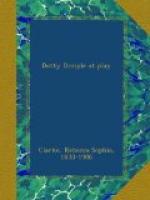“No, of course they wouldn’t hang him. They said it was the third degree, and they sent him to the State’s Prison.”
“O, is your father in the State’s Prison?”
Dotty thought if her father were in such, a dreadful place, and she herself were blind, she should not wish to live; but here was Emily looking just as happy as anybody else. Indeed, the little girl was rather proud of being the daughter of such a wicked man. She had been pitied so much for her misfortunes that she had come to regard herself as quite a remarkable person. She could not see the horror in Dotty’s face, but she could detect it in her voice; so she went on, well satisfied.
“There isn’t any other little girl in this school that has had so much trouble as I have. A lady told me it was because God wanted to make a good woman of me, and that was why it was.”
“Does it make people good to have trouble?” asked Dotty, trying to remember what dreadful trials had happened to herself. “Our house was burnt all up, and I felt dreadfully. I lost a tea-set, too, with gold rims. I didn’t know I was any better for that.”
“O, you see, it isn’t very awful to have a house burnt up,” said Emily; “not half so awful as it is to have your eyes put out.”
“But then, Emily, I’ve been sick, and had the sore throat, and almost drowned—and—and—the whooping-cough when I was a baby.”
“What is your name?” asked Emily; “and how old are you?”
“My name is Alice Parlin, and I am six years old.”
“Why, I am nine; and see—your head! only comes under my chin.”
“Of course it doesn’t,” replied Dotty, with some spirit. “I wouldn’t be as tall as you are for anything, and me only six—going on seven.”
“I suppose your paw is rich, and good to you, and you have everything you want—don’t you, Alice?”
“No, my father isn’t rich at all, Emily, and I don’t have many things—no, indeed,” replied Miss Dimple, with a desire to plume herself on her poverty and privations. “My aunt ’Ria has two girls, but we don’t, only our Norah; and mother never lets me put any nightly-blue sirreup on my hangerjif ’cept Sundays. I think we’re pretty poor.”
Dotty meant all she said. She had now become a traveller; had seen a great many elegant things; and when she thought of her home in Portland, it seemed to her plainer and less attractive than it had ever seemed before.
“I don’t know what you would think,” said Emily, counting over her trials on her fingers as if they had been so many diamond rings, “if you didn’t have anything to eat but brown bread and molasses. I guess you’d think that was pretty poor! And got the molasses all over your face, because you couldn’t see to put it in your mouth. And had that woman shake you every time you spoke. And your paw in State’s Prison because he killed a man. O, no,” repeated she, with triumph, “there isn’t any other little girl in this school that’s had so much trouble as I have.”




